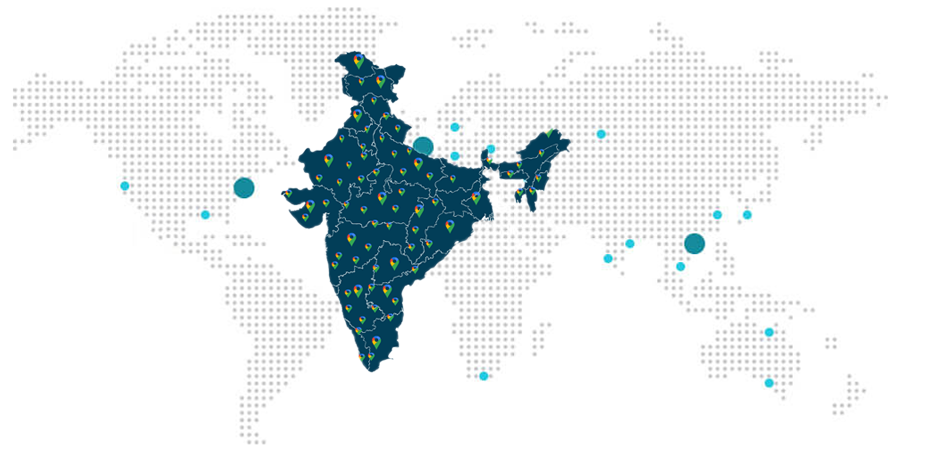Home / GST Registration
What is GST registration?
The Goods and Services Tax (GST), which was passed on July 01, 2017, is applicable to all Indian service providers, traders, and manufacturers. Several central taxes such as CST, service tax, excise duty, as well as state taxes such as VAT, entertainment tax, octroi, and luxury tax, have been combined into a single tax known as GST, which was launched on 01.07.2017.Every business with annual revenue of more than Rs.40 lakhs is required to register for GST. Certain types of businesses require GST registration. If a business is operated without being registered for GST, this is a violation of GST law.
This law was passed on 01 July 2017, with the goal of eliminating all other indirect taxes in the country. GST is applicable to all services and goods(except the exempted one) produced and manufactured in India. As a result of the new labour law modifications, this would also apply to freelancers.
GST Registration Online
There is a simple way to undergo online GST registration. Taking the help of the automated process, all the paperwork can be easily submitted online without needing any physical documentation.
Any Questions? Request a callback from our Tax Experts.
Who Should Register for GST?

What is the GST registration process?
GST Registration Process refers to the completely online process of registering for GST in India. It is completely automated and does not require manual intervention or physical paper submissions.
Documents Required for GST Registration
New GST registration requires the following necessary documents:
GST registration documents
- Sole Proprietorship
- Identification and Address proof of the sole proprietor
- PAN card
- Other information (If any)
- Private Limited Company
- Certificate of Incorporation
- PAN card
- Digital signature certificate
- DIN number
- MOA and AOA
- Board resolution signed by the Directors
- Registered business address
- Identification proof of all the directors
- Limited Liability Partnership
- Address proof of the LLP
- PAN card of the LLP
- LLP Agreement
- Name of the partners and other information (If any)
GST Registration Fees
While the government of India does not impose a fee for GST registration online under the Goods and Services Tax (GST) system, individuals and companies registering for GST online are required to pay a fee for professional services. By using FinacBook's professional services, businesses can look forward to lucrative deals that can be cost-effective as well as pocket friendly.
GST Registration online with FinacBooks is a simple and hassle-free process. The applicant only needs to submit the required documents, provide the important information such as business details, and pay the service provider's cost.
What are the components of GST?
GST is composed of three components, which are commonly referred to as:
- Central Goods and Services Tax (CGST)
- State Goods and Services Tax (SGST)
- Integrated Goods and Services Tax (IGST)
- Central Goods and Services Tax (CGST) – The CGST is levied on the intrastate supply of various goods and services. Usually, the Central Government charges CGST and collects this. As a result, both the Central and State Governments' GST collections will be combined, and revenue shared equally.
- State Goods and Services Tax (SGST) – This tax is levied on the intrastate supply of various goods and services. This tax is charged by the state government.
- Integrated Goods and Services Tax (IGST) – The tax levied on the interstate supply of various goods and services is referred to as integrated goods and services tax. Again, the IGST is collected and split between the Central and State governments.
Any Questions? Request a callback from our Tax Experts.
Who needs GST Registration?
GST registration is required by business owners in India like service providers, traders, and manufacturers. GST registration is a must to carry out business-related transactions on a daily ongoing basis.
What are the GST tax rates?
The government has introduced a range of various tax rates for GST registration. These tariffs are subject to change in accordance with the government's requirements.The following website contains an exhaustive list of GST tax rates: https://cbic-gst.gov.in/gst-goods-services-rates.html.
The government levies the following rates:
- Basic need items – No GST tax is imposed on basic need items.
- Household items and drugs – A 5% surcharge is applied to basic household items and drug applications.
- Hair oil, raw materials, capital goods, and other industrial goods – Consumer items and capital goods used in various industrial operations are taxed at an 18% tax rate.
- Computer products and Processed Foodstuffs – Computer products and other processed foods are taxed at a rate of 12%.
- Luxury items – Luxury items are subject to a 28% GST. Cars and other forms of goods like TV, Fridge are some of the examples of luxury goods.
What is a GST Return?
A GST Return is a document that contains information about income and is required by law to be filed with the tax authorities. A taxpayer is required to file two monthly returns and one annual return under the GST law. All returns must be filed electronically (Online). Please keep in mind that there is no provision for amending or revising returns. All unreported invoices from the prior tax period must be included in the current month.
What is GSTIN?
GSTIN is a unique identification 15-digit number assigned to every GST taxpayer on the basis of their PAN and state. A person with a GSTIN number can log onto the GST portal anytime to validate a GSTIN number. GSTIN registration is a pretty simple process that is made even simpler when done through Finacbooks.
How to Register for GST?
This GST registration law was passed in 2017; consequently, the government has automated its operations. It is completely an online process. The following GST registration procedures must be taken to register for GST in India:
- Login to the Official GST website: The applicant must log in to the official GST website - https://www.gst.gov.in/. Next, the applicant must select the tab "Services" and then GST Registration. After that, the applicant must click on“GST new registration” and be redirected to the portal, which would request login information and other details.
- Information filling: The applicant must then fill in the requested information. This will include the business entity's name, its type, and its PAN information.
- E-mail ID and a mobile number: The candidate must proceed to the next step and include contact information such as an Email Id and a Mobile Number. All future messages will be received via the email address and mobile number provided.
- Generation of Temporary Reference number: Once the applicant has entered all of the required information, an OTP (One Time Password) will be generated, and the applicant will also receive a TRN. This is referred to as the temporary reference number (TRN).
- Input Captcha Details: The applicant will then be prompted to enter the TRN and the displayed Captcha image. After that, the applicant must click on proceed.
- GST registration page: The applicant will then be forwarded to another web page known as the GST registration page. The applicant must provide all pertinent business information. This will include all relevant business data. This form must also indicate the date the business was incorporated.
- Fill and complete the details: All relevant data about the promoters or directors must be included. If you are operating as a partnership firm, you must submit the partner's information. The form must include all relevant information about the goods. Any new location for the sale of goods must be included on the application form.
- Upload the required documents: The applicant must upload all necessary business documents.
- Save and submit the application for ARN number: The final step requires the applicant to save and submit the application to the appropriate authority. The email and SMS will contain the ARN number.
Benefits of GST Registration
A business will reap numerous benefits from GST registration. Some of the most common benefits include the following:
- Recognition: The law will recognize businesses that have registered in accordance with the GST requirements. Consumers and the public will identify businesses that have registered in accordance with the government's requirements.
- Appropriate accounting: By registering with the GST authorities, you may ensure that appropriate accounting cycles are followed.
- Reduced tax rates: If a taxpayer's annual revenue is less than Rs.1.5crore, the taxpayer may opt for the composition tax system. There is an incentive to pay less tax under the composition tax scheme.
- Government benefits and incentives: Numerous government benefits and incentives are available to businesses that register for GST.
- Double taxation relief: Any business that registers for GST in accordance with the government's requirements qualifies for tax benefits and exemptions from double taxation.
- E-way bill: By using this method of registration, a new logistics system known as the E-Way Bill can be utilised.
- Penalty protection: If your firm meets the eligibility criteria for GST registration, you must register or face penalties and/or fines.
Which businesses or Entities require GST registration?
The following businesses are required to register under the GST:
- Businesses with a specific threshold limit - Businesses with a Taxable Turnover of more than Rs.40 lakhs for goods and Rs.20 lakhs for services. GST is calculated based on the annual business turnover.
- Interstate outward supply - All businesses that make interstate outward supplies of goods and services would be required to consider GST registration on a mandatory basis.
- E-commerce entities - Generally, e-commerce entities, particularly those that supply through an e-commerce aggregator and each e-commerce aggregator, must consider GST registration.However, as per a recent notification, e-commerce businesses with annual revenue of less than Rs.20 lakhs are not required to register.
How to apply for GST Registration?
The method to apply for new GST registration is pretty simple and easy. You can register online and file all the documents online as well. The online process has been hassle-free. We’ve covered it above under the registration process for your reference.
How FinacBooks can help in online GST registration?
FinacBooks is one the leading accounting & financial company in India. Our team helps you in easily submitting your GST registration online without any delay. The tax deadline is a big worry. We always take care of the tax deadline and submit the correct client information to the tax authorities as soon as possible. FinacBooks team is having more than 10 years of experience in handling GST registration process and provides the best services to everyone including our valuable clients. Finacbooks not only provide perfect solutions of the tax issues but also give important tips and advices to their clients. We will remain in touch with you and every update will be sent to you by way of calls and e-mails. You don't have to worry about the GST registration fees as it can be discussed and an affordable price will be communicated to you. We are taking very less GST registration fees as compared to our competitors. Kindly call us at 8800221252 or you can also e-mail us at info@finacbooks.com.
Any Questions? Request a callback from our Tax Experts.
GST registration FAQs
There are no GST return filing fees associated with filing returns through the government portal. However, if you seek the assistance of a chartered accountant, you can be charged with professional fees.
According to section 122 of the CGST Act, any taxable person who fails to register for GST, even if legally required to do so, must pay the following penalty: Whichever is higher - 10,000 INR or the amount of tax evaded.
GST is applicable to all individuals, firms, companies, HUFs, LLPs, AOPs, societies, co-operative societies, trusts, etc.
To obtain a GST number, you must submit your application for GST registration using the GST portal, i.e., www.gst.gov.in. To begin, you will need a valid email address, mobile phone number, and a company PAN.
Under the GST regime, any regular business with an annual aggregate revenue of more than Rs.5 crore must file two monthly returns and one annual return. This works out to 26 returns per year. For quarterly GSTR-1 filers subject to the QRMP system, the number of GSTR filings varies. They file nine GSTR’s online each year, including the GSTR-3B and annual return. Special circumstances, such as composition dealers with a maximum of 5 GSTR filings per year, are required to file separate returns.
Yes, if the business's annual revenue exceeds Rs.20 lakh, the sole proprietorship needs to register for GST.
Rs.40 Lakh (In case of goods) and Rs.20 Lakh (In case of services) is the threshold limit for GST set by the government for businesses. Any business exceeding this limit needs to pay GST on goods and services.
What Clients Say

Prakash Verma


Praveen Chauhan


Pradeep Kochhar

Blogs
In today's dynamic business landscape, navigating through various regulatory requirements and financial obligations can be... Read More
FinacBooks is a reliable platform that helps business owners in getting verified leads. It offers various services and solutions that can... Read More
Starting a new business in India requires several legal procedures, paperwork, and timely compliance with regulatory authorities. Company... Read More









